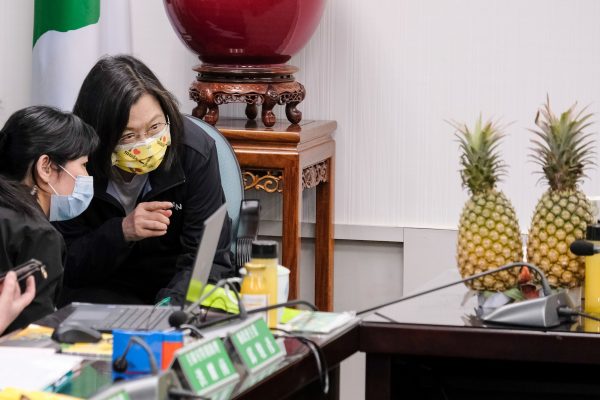Unlike the banana ban in 2012, this pineapple ban’s timing appears mysterious because no incident preceded the suspension. Taiwan President Tsai Ing-wen called the announcement ‘ambush-like’ .
The larger background to this ban involves the triangular dynamics between Beijing, Taipei and Washington. The Biden administration’s statements and actions since its inauguration indicate that it will continue the Trump administration’s strong support of Taiwan. The pineapple ban is Beijing’s signal to Taipei that it cannot circumvent the influence of Beijing over its affairs, even with US support.
The ban could also be explained with reference to Taiwan’s pro-independence Democratic Progressive Party (DPP) government having recently reshuffled its Mainland Affairs Council (MAC). The new MAC head has signalled optimistic expectations in breaking the cross-Strait impasse. The pineapple ban lays bare the reality of cross-Strait relations when there is no official channel to deal with an issue as minor as ‘harmful creatures’ found on pineapples. Beijing reiterated its political precondition for exchange — that Taipei needs to find a way to come to terms with Beijing’s ‘one China’ principle — and laid the blame for disrupted cross-Strait relations on the DPP government.
The ban might just be another attempt to squeeze Taiwan, the newest measure in a long process that kicked off in 2016. China has thwarted Taiwan’s international participation, most noticeably in the World Health Organization (WHO) during the pandemic. The Chinese military has increased its vessels in areas around Taiwan, most recently intruding into Taiwan’s southwest air defence identification zone. Economically, China has cut tourists to Taiwan and suspended its contract production with the island. The pineapple ban falls under this last category of measures.
Beijing’s aim is not to economically sanction Taiwan as a whole but to target sanctions against the DPP’s core constituencies. These include the so-called ‘three middles and one youth’ who tend to be more sympathetic to the DPP: middle-to-small businesses, middle-to-southern Taiwan, middle-to-low-income people, and Taiwan’s youth. The pineapple farmers fall into the overlap of several of these categories. It has been rumoured that China’s next sanction target might be wax apples, predominantly grown in southern Taiwan.
Since the ban, Taipei has tried to highlight what it perceives as Beijing’s coercion and has sought to garner international support by launching a #FreedomPineapples campaign. The slogan mimics the #FreedomWine tagline supporting Australian wines sanctioned by China. Australia and Taiwan’s cases are similar because China denied access to its massive market as a tool of economic coercion to signal its displeasure with Canberra’s and Taipei’s political behaviour.
Both instances also show China’s preference for grey-zone trade coercion by cutting off market access on regulatory grounds. This form of coercion allows China to deny it is using economic sanctions.
The cases of Australia and Taiwan also differ in significant ways. China’s dispute with Taiwan is fundamentally about Taiwan’s status — the ‘one China’ issue — which China does not expect to find a solution to in the short term. China’s disputes with Australia are about Canberra’s policies, including the banning of Huawei in Australia’s 5G construction and calling for an independent investigation into China’s handling of the COVID-19 outbreak. Policy issues between China and Australia will shift continually. Beijing has targeted some of Australia’s largest exports to China to deter Canberra from encroaching on China’s interests in the future.
Beijing has not targeted Taiwan’s top exports to China. Taiwan’s pineapples rely primarily on the domestic market, with exports to China only accounting for 9 per cent of sales. China also hopes to win Taiwan’s hearts and minds. Following the pineapple ban, Beijing announced a package of 22 new incentive measures, including offering land and financial support to encourage Taiwan’s agricultural businesses to invest in China.
If China presses too hard on Taiwan’s status, there is a genuine risk that economic coercion could transition into armed conflict. Taipei may show its defiance by moving towards independence and this might force Beijing’s hand. China has avoided putting all-out economic pressure on Taiwan to allow both sides an opportunity to maintain peace, despite an increasingly tense relationship.
The pineapple ban might not actually be premeditated and China’s phytosanitary concerns could be real. But by choosing not to talk to Taipei to resolve the issue, Beijing’s message has been delivered: Taiwan cannot circumvent China and, without a common political understanding, breaking the cross-Strait impasse will remain wishful thinking.
Dalton Lin is Assistant Professor at the Sam Nunn School of International Affairs, Georgia Institute of Technology, and the Executive Editor of Taiwan Security Research.

